The Verdict: Wp Engine is the obvious choice for those seeking the most reliable and robust hosting platform.
Choosing the right hosting provider is among the most critical decisions when setting up an eCommerce website.
The performance, security, and reliability of your hosting can directly impact your sales, customer satisfaction, and overall online success.
With countless hosting companies available, each offering various features and pricing plans, selecting the best hosting companies for your Ecommerce site can be challenging.
Unlike standard websites, Ecommerce sites have specific requirements.
They need to handle higher traffic volumes, ensure the security of sensitive customer data, and provide seamless, fast-loading pages to prevent cart abandonment.
Additionally, features like easy integration with shopping carts, payment gateways, and inventory management systems are crucial for the smooth operation of an online store.
Best Hosting Companies – Key Features:
| Hosting Company | Uptime Reliability | Speed & Performance | eCommerce Features | Scalability | Customer Support | Pricing | Security | User-Friendliness | Overall Rating |
|---|---|---|---|---|---|---|---|---|---|
| Bluehost | 4.9 | 4.6 | 4.5 | 4.7 | 4.8 | 4.7 | 4.6 | 4.8 | 4.7 |
| SiteGround | 4.9 | 4.8 | 4.7 | 4.7 | 4.9 | 4.5 | 4.8 | 4.7 | 4.8 |
| HostGator | 4.7 | 4.5 | 4.4 | 4.6 | 4.5 | 4.6 | 4.4 | 4.6 | 4.5 |
| A2 Hosting | 4.8 | 4.9 | 4.6 | 4.6 | 4.7 | 4.5 | 4.7 | 4.7 | 4.7 |
| InMotion Hosting | 4.8 | 4.7 | 4.7 | 4.7 | 4.8 | 4.6 | 4.8 | 4.7 | 4.7 |
| WP Engine | 4.9 | 4.9 | 4.8 | 4.8 | 4.9 | 4.4 | 4.9 | 4.8 | 4.8 |
| Kinsta | 4.9 | 5.0 | 4.9 | 4.9 | 4.9 | 4.3 | 5.0 | 4.8 | 4.9 |
This table gives a clear overview of the strengths and weaknesses of each hosting provider, helping you make an informed decision based on your specific needs.
1. Kinsta
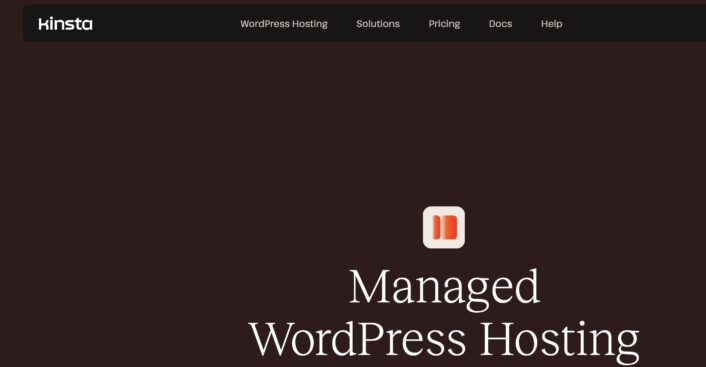
Overview:
Kinsta is a managed WordPress hosting provider that offers premium hosting solutions focusing on speed, security, and performance.
It’s ideal for high-traffic eCommerce websites that need reliable and scalable hosting.
Key Features:
Google Cloud Platform: Kinsta is powered by Google Cloud, offering top-tier infrastructure for maximum performance and reliability.
eCommerce Optimization: Kinsta is optimized for WooCommerce, providing features like automatic scaling during traffic surges.
Automatic Backups: Daily automatic backups ensure your site’s data is always safe.
Free CDN: Kinsta includes a free CDN powered by KeyCDN, enhancing global site performance.
Advanced Security: Kinsta offers proactive security measures, including DDoS detection, hardware firewalls, and malware scanning.
Pricing:
Kinsta’s pricing starts at $35 per month, which includes managed WordPress hosting, free CDN, and access to their premium features.
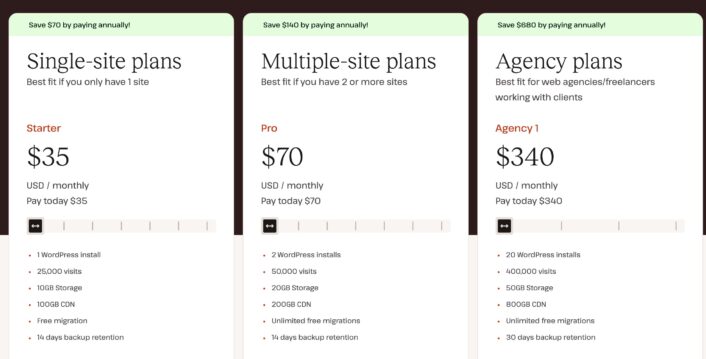
Pros and Cons:
Pros:
Powered by Google Cloud Platform
Excellent performance and speed
Advanced security features
Automatic scaling for high-traffic
Cons:
Higher pricing
Limited to WordPress-based sites
Performance and Reliability:
Kinsta guarantees a 99.9% uptime backed by Google Cloud’s infrastructure. Their hosting environment is optimized for speed and reliability, making it ideal for high-traffic eCommerce sites.
Customer Support:
Kinsta offers 24/7 support through chat and a ticket system. Their support team is highly specialized, particularly in handling WordPress and WooCommerce issues, ensuring that your eCommerce site runs smoothly.
2. WP Engine
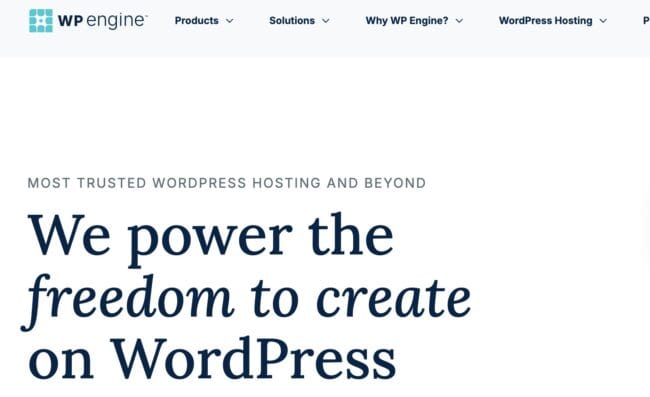
Overview:
WP Engine is a premium managed WordPress hosting provider highly optimized for performance and security.
It’s an excellent choice for eCommerce sites built on WordPress and WooCommerce, offering a range of features tailored to these platforms.
Key Features:
Managed Hosting: WP Engine handles all the technical aspects of hosting, including updates, security, and backups.
eCommerce Optimization: Their platform is optimized for WooCommerce, providing faster loading times and better performance.
StudioPress Themes: WP Engine includes access to premium StudioPress themes designed for performance and SEO.
Global CDN: WP Engine offers a global CDN to enhance site speed and performance.
Advanced Security: WP Engine provides enterprise-grade security features, including daily backups, malware scanning, and firewall protection.
Pricing:
WP Engine’s plans start at $20 per month, which includes managed hosting, CDN, and premium themes.
It’s a higher price point but offers extensive features and performance optimizations.
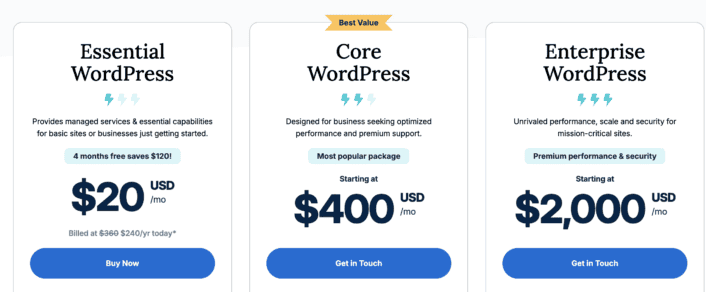
Pros and Cons:
Pros:
Optimized for WordPress and WooCommerce
Premium managed hosting features
Access to StudioPress themes
Advanced security features
Cons:
Higher cost compared to other providers
Limited to WordPress-based sites
Performance and Reliability:
WP Engine is known for its excellent performance, with a focus on fast loading times and high uptime. They guarantee a 99.95% uptime, making it a reliable option for eCommerce sites.
Customer Support:
WP Engine offers 24/7 customer support, including chat, phone, and a ticket system. Their support team is highly knowledgeable, particularly in WordPress-related issues, making them a valuable resource for eCommerce sites.
3. Bluehost
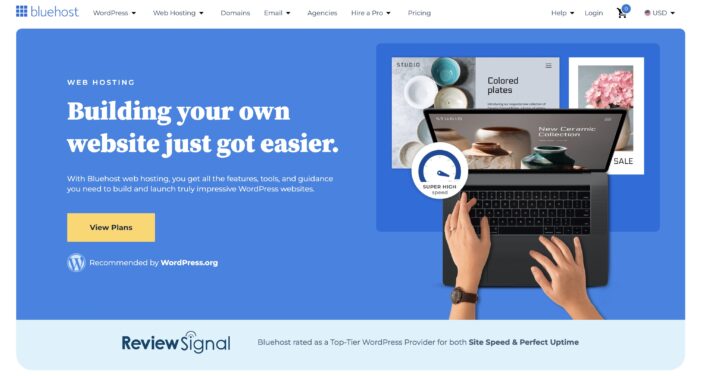
Overview:
Bluehost is one of the most well-known hosting providers, particularly for WordPress users.
It offers various hosting solutions, including shared, VPS, and dedicated hosting, making it a versatile option for various websites, including eCommerce.
Key Features:
Free Domain: Bluehost offers a free domain for the first year, which is excellent for new businesses.
eCommerce Integration: It provides seamless integration with WooCommerce, a popular eCommerce platform for WordPress.
Resource Protection: Bluehost uses technology to isolate user accounts, ensuring that others on the same server don’t affect your eCommerce site’s performance.
Scalability: Bluehost allows easy upgrades to more powerful hosting solutions as your business grows.
24/7 Support: Reliable customer support through chat, phone, and email.
Pricing:
Bluehost’s pricing for eCommerce hosting starts at $2.95 per month, which includes a free SSL certificate, domain, and access to their WordPresscentric tools.
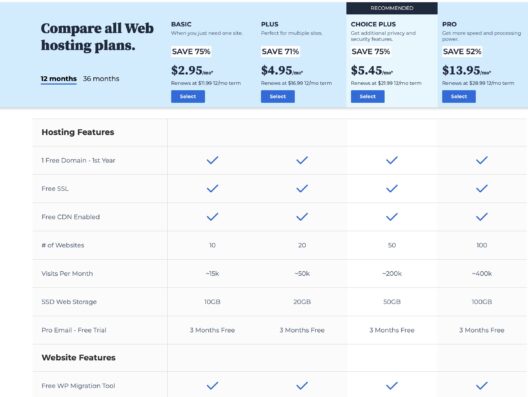
Pros and Cons:
Pros:
Affordable pricing
Easy WooCommerce integration
Strong uptime and performance
Free domain and SSL for the first year
Cons:
Higher renewal rates
Additional costs for some essential features
Performance and Reliability:
Bluehost offers a 99.99% uptime guarantee, ensuring that your eCommerce site remains accessible to customers.
Its servers are optimized for WordPress, providing excellent speed and performance.
Customer Support:
Bluehost is known for its responsive and knowledgeable customer support.
They offer 24/7 assistance through various channels, ensuring help is available when needed.
4. SiteGround
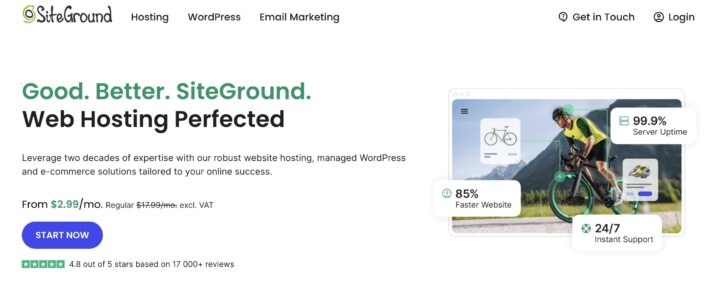
Overview:
SiteGround is another popular choice for eCommerce hosting, particularly favored for its robust security features and exceptional customer support.
It’s a preferred host for many WordPress and WooCommerce users due to its speed and reliability.
Key Features:
SuperCacher Technology: This feature helps to speed up your website significantly, improving load times and reducing bounce rates.
Managed WordPress Hosting: SiteGround offers managed WordPress hosting, ideal for eCommerce stores built on WordPress and WooCommerce.
Daily Backups: Automated daily backups ensure your site’s data is always safe.
Free CDN: SiteGround includes a free CDN (Content Delivery Network) to enhance site performance globally.
AI AntiBot System: Their AIdriven antibot system prevents brute force attacks, enhancing site security.
Pricing:
SiteGround’s eCommerce hosting starts at $2.99 per month.
This includes essential features such as daily backups, SSL certificates, and managed updates.

Pros and Cons:
Pros:
Excellent customer support
Strong security features
Fast loading times
Managed updates for WordPress users
Cons:
Higher starting price
Limited storage on lower-tier plans
Performance and Reliability:
SiteGround is known for its reliable performance, with a 99.99% uptime guarantee.
Their advanced caching and CDN services ensure that eCommerce websites load quickly, even during traffic spikes.
Customer Support:
SiteGround’s customer support is highly rated, offering 24/7 chat, phone, and ticket service.
Their knowledgeable support team can assist with technical and general inquiries.
5. HostGator
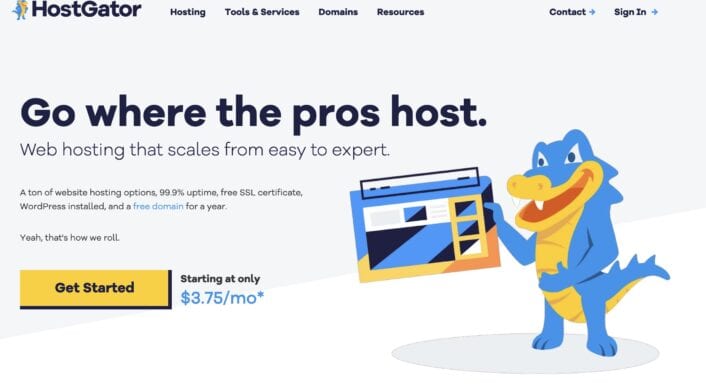
Overview:
HostGator is a versatile hosting provider offering a wide range of hosting services, including shared, cloud, VPS, and dedicated hosting.
It’s particularly well suited for small to medium-sized eCommerce websites.
Key Features:
Scalability: HostGator allows easy scaling of resources as your eCommerce site grows.
OneClick Install: HostGator offers one-click installation for popular eCommerce platforms like Magento, WooCommerce, and others.
Free Website Builder: They provide a free website builder with drag-and-drop functionality, making it easier for beginners to set up their online store.
Unmetered Bandwidth: HostGator offers unmetered bandwidth, ensuring your site can handle high traffic volumes.
Free SSL Certificate: SSL certificates are included with all plans to secure your eCommerce transactions.
Pricing:
HostGator’s eCommerce hosting plans start at $3.75 per month, which includes unmetered bandwidth, a free SSL certificate, and easy-to-use tools for online store creation.
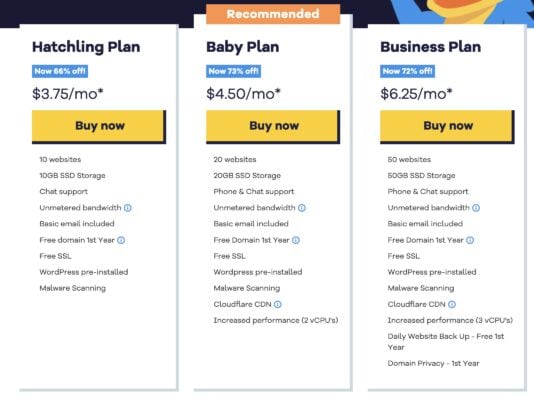
Pros and Cons:
Pros:
Affordable plans
Unmetered bandwidth
Free website builder
Easy scaling options
Cons:
Upselling during the signup process
Average customer support
Performance and Reliability:
HostGator guarantees a 99.9% uptime, making it a reliable option for eCommerce sites.
Their cloud hosting solutions offer additional speed and redundancy, ensuring your site remains online and responsive.
Customer Support:
HostGator offers 24/7 support via chat, phone, and email.
While their support is generally reliable, some users have reported longer peak-hour wait times.
6. A2 Hosting

Overview:
A2 Hosting is known for its speed, making it an excellent choice for eCommerce websites prioritizing fast loading times.
It offers a variety of hosting solutions, including shared, VPS, and dedicated hosting.
Key Features:
Turbo Servers: A2 Turbo Servers are optimized for speed, offering up to twenty times faster page loads than standard hosting.
Free Website Migration: A2 offers free website migration,
making transferring your existing eCommerce site to their platform easy.
eCommerce Optimized: A2 Hosting is optimized for popular platforms like WooCommerce, Magento, and OpenCart.
Anytime MoneyBack Guarantee: A2 Hosting offers a prorated money-back guarantee, ensuring customer satisfaction.
Free SSL and SSD: A2 Hosting includes free SSL certificates and SSD storage with all plans, enhancing security and performance.
Pricing:
A2 Hosting’s monthly pricing starts at $1.95 for their eCommerce optimized plans.
This includes Turbo Servers, free SSL, and a range of eCommerce integrations.
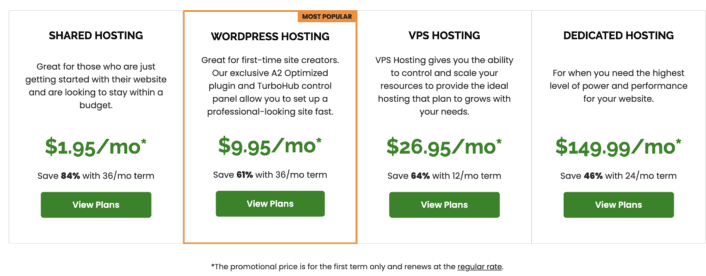
Pros and Cons:
Pros:
Fast loading times with Turbo Servers
Free website migration
Optimized for eCommerce platforms
Anytime moneyback guarantee
Cons:
Higher cost for Turbo Server plans
Limited data centers outside the U.S.
Performance and Reliability:
A2 Hosting’s Turbo Servers ensure fast loading times, which is crucial for reducing cart abandonment on eCommerce sites.
They offer a 99.9% uptime guarantee.
Customer Support:
A2 Hosting offers 24/7 support through chat, phone, and email.
Their Guru Crew Support is highly rated for its expertise in helping with performance optimization and site migration.
7. InMotion Hosting
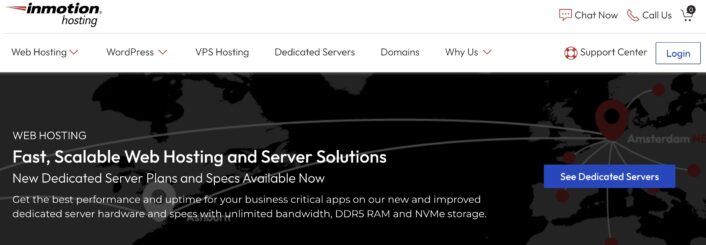
Overview:
InMotion Hosting is a well-regarded provider that offers a range of hosting solutions, including shared, VPS, and dedicated hosting.
Best Known for its reliable performance, excellent customer support, and strong security features, it is a solid choice for eCommerce websites.
Key Features:
Free Domain and SSL: InMotion Hosting includes a free domain for the first year and SSL certificates with all plans.
eCommerce Ready: InMotion easily integrates with popular eCommerce platforms like WooCommerce, PrestaShop, and Magento.
Free Website Migration: They offer free website migration, making switching to their hosting services easy.
Scalable Hosting Solutions: InMotion allows easy upgrades to VPS and dedicated hosting as your business grows.
Pricing:
InMotion Hosting’s eCommerce plans start at $2.99 per month. This includes a free domain, SSL certificate, and access to their eCommerce integrations.

Pros and Cons:
Pros:
Strong security features
Free domain and SSL
Free website migration
Scalable hosting solutions
Cons:
Higher pricing for VPS and dedicated plans
Limited data center locations
Performance and Reliability:
InMotion Hosting guarantees a 99.9% uptime, ensuring your eCommerce site remains online. Their servers are optimized for speed, particularly when using SSD storage solutions.
Customer Support:
InMotion Hosting is known for its excellent customer support, offering 24/7 chat, phone, and email assistance. Their support team is particularly praised for its expertise and responsiveness.
How to Choose the Right eCommerce Hosting Provider
When selecting an eCommerce hosting provider, it’s essential to consider your specific needs and business goals.
Here are some key factors to guide your decision:
Identifying Your Business Needs: Consider the volume of traffic you expect, the complexity of your site, and the features you require.
For example, high-traffic sites will benefit from providers like Kinsta or WP Engine, which offer robust performance and scalability.
Importance of Scalability: Your hosting needs will evolve as your business grows.
Choose a provider that offers easy scalability, allowing you to upgrade resources without downtime.
Evaluating Performance and Uptime: Downtime can cost your business sales and damage your reputation.
Look for hosts with strong uptime guarantees and fast server speeds, like A2 Hosting or SiteGround.
Considering Security Features: eCommerce sites handle sensitive customer data, making security paramount.
Opt for providers that offer advanced security features like SSL certificates, DDoS protection, and daily backups.
Support and Customer Service: Reliable customer support is crucial, especially if you’re running an eCommerce site that operates around the clock.
Choose providers with 24/7 support and a reputation for quick, practical assistance.
Conclusion
Selecting the right hosting provider is critical to the success of your Ecommerce website.
The best hosting companies for Ecommerce websites offer a range of features tailored to meet the unique demands of online stores, from performance and security to scalability and support.
When choosing your hosting provider, consider your specific needs, such as traffic volume, required features, and budget.
By carefully evaluating these factors, you can select the hosting provider that will best support your business growth and ensure a smooth, secure online shopping experience for your customers.
Read our review on the best ecommerce platformsBenjamin Shemesh is an ecommerce enthusiast and a digital marketing expert.
He loves surfing the ocean
